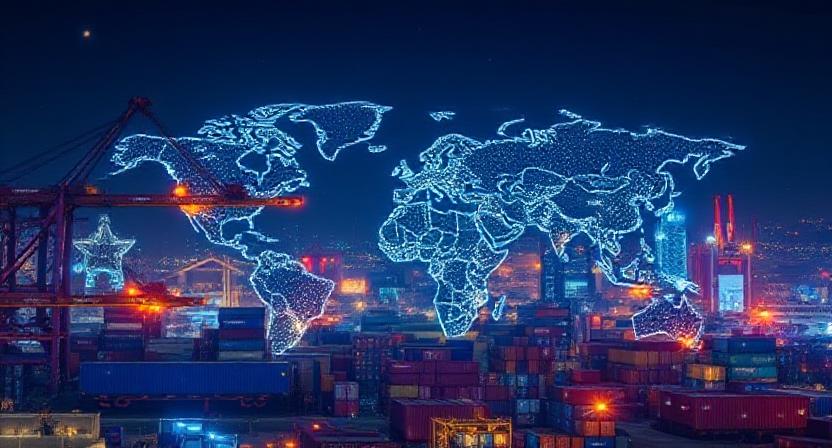Global trade is undergoing a major shift, driven by the rapid evolution of B2B services. Whether it’s through digital marketplaces that facilitate cross-border transactions or advanced logistics and financial technologies, these modern solutions are breaking down long-standing barriers. As a result, businesses of all sizes can now connect, compete, and collaborate more efficiently in an increasingly integrated global economy.
The Rise of Digital B2B Platforms
Connecting Global Buyers and Suppliers
One of the most significant changes in recent years is the widespread adoption of digital B2B marketplaces like Alibaba.com, Amazon Business, and global wholesale platforms. These platforms offer a centralized space where buyers and sellers from different countries can interact, negotiate, and finalize deals—all without leaving their offices.
Such online B2B services drastically reduce the cost and complexity of entering international markets. Small and medium-sized enterprises (SMEs), which previously struggled to connect with overseas buyers due to limited resources, now have access to a global audience.
Real-Time Communication and Trust Building
Advanced communication tools integrated into B2B platforms, such as instant messaging, video calls, and real-time order tracking, enhance transparency and trust between international trading partners. These features help build long-term business relationships and ensure smoother transactions.
Streamlining Operations Through Technology
Automated Supply Chain Management
Modern B2B services offer supply chain automation, which is crucial for businesses dealing with international logistics. From inventory management to shipment tracking and customs documentation, automated tools ensure efficiency and accuracy throughout the supply chain.
For example, SaaS (Software-as-a-Service) solutions tailored for exporters help streamline complex processes like compliance checks, export documentation, and tariff calculations—saving time and reducing the risk of costly errors.
Fintech Solutions for Cross-Border Payments
One of the biggest challenges in global trade has always been managing international payments. B2B fintech services are addressing this by providing secure, fast, and cost-effective solutions for cross-border transactions. Services like Payoneer, Wise, and Revolut Business allow companies to send and receive payments in multiple currencies with lower fees and real-time exchange rates.
These services are particularly beneficial for businesses in emerging markets that face restrictions or high banking costs with traditional international wire transfers.
Empowering SMEs to Compete Globally
Leveling the Playing Field
In the past, large corporations dominated global trade due to their access to capital, networks, and infrastructure. Today, B2B e-commerce services have leveled the playing field. SMEs can now source raw materials globally, find manufacturing partners, and even sell directly to international distributors or retailers without needing a local presence.
Customized B2B Support Services
Support services like export consulting, B2B lead generation, and digital marketing for exporters are becoming essential. Companies offering these services specialize in helping businesses tailor their offerings to international audiences, optimize product listings, and reach targeted buyers across platforms.
This targeted assistance is revolutionizing how companies go to market, ensuring better conversion rates and sustainable growth.
Enhancing Trade Compliance and Security
Navigating Complex Trade Regulations
International trade involves navigating a maze of tariffs, regulations, and compliance requirements. B2B compliance platforms are using AI and machine learning to help businesses stay updated on regulatory changes and avoid penalties. Services that offer automated compliance reports, digital certificates, and risk assessments are gaining traction among exporters and importers alike.
Cybersecurity in B2B Transactions
As more trade activity moves online, cybersecurity in B2B trade has become a priority. Businesses now rely on secure transaction platforms that use encryption, multi-factor authentication, and fraud detection systems to protect sensitive data and financial transactions.
Looking Ahead: The Future of Global B2B Trade
AI, Blockchain, and Predictive Analytics
The next phase of B2B services will see deeper integration of AI, blockchain, and predictive analytics. AI-powered platforms can suggest ideal trade partners, forecast demand, and even optimize pricing strategies. Blockchain is enhancing transparency and traceability in supply chains, particularly in industries like food, pharmaceuticals, and electronics.
Predictive analytics tools allow exporters and manufacturers to make smarter decisions based on real-time market trends, buyer behavior, and seasonal demand patterns, offering a major competitive edge.
Sustainable and Ethical Sourcing
Buyers are becoming more conscious of the environmental and social impact of their sourcing decisions. B2B services are responding with features that highlight certifications, sustainability practices, and ethical sourcing data. This shift toward responsible trade is being led by platforms that empower businesses to showcase their commitment to ESG (Environmental, Social, and Governance) standards.
Conclusion
The digital transformation of global trade is well underway, and B2B services are at the heart of this revolution. From simplifying cross-border transactions to enabling real-time communication and providing compliance support, these services are making global trade more inclusive, efficient, and secure.
For businesses aiming to expand their international footprint, investing in the right B2B tools and services isn’t just an option it’s a necessity. As we move into a future defined by connectivity, automation, and data-driven decisions, those who embrace the power of B2B services will be best positioned to lead in the global marketplace.
